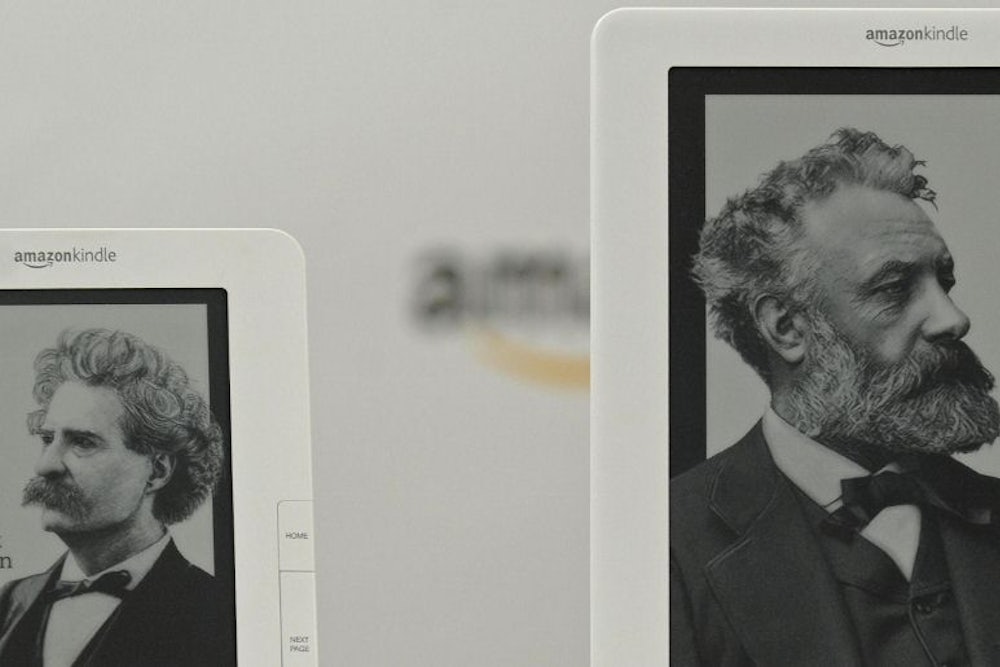One of the great small pleasures of used books is the occasional marginalia of a previous owner. You learn a tiny bit about that anonymous soul by seeing the passages she underlined, or tidily double-underlined, or exclamation-pointed, or starred madly and messily. You begin to worry about the girl who found so much to mark in To The Lighthouse, or fall in love, a little bit, with the person who found all the funniest parts of Catch 22. (It is another type of intimacy entirely to borrow a book from someone you know, and to discover what he found worth picking up a pen for.)
This experience would seem to be lost as reading becomes ever more digital—ebook sales rose more than 44 percent last year—but that’s not entirely the case. Amazon keeps track of which passages Kindle readers highlight most, which means the company can offer a new version of the old serendipitous experience. Only this one is data-driven: The company also keeps a running list of the most highlighted Kindle passages of all time. Instead of a cozy tete-a-tete with the idiosyncratic mind of a stranger, you get the reading equivalent of a giant rave, a warehouse pulsing with usually private emotions turned into shared public expressions. It's a glimpse into our collective, most interior, and most embarrassing preoccupations.
The most immediately noticeable thing about the list is how Hunger Games-heavy it is. Nineteen of the top 25 most-highlighted passages are written by Suzanne Collins, who is not exactly known for a glittering prose style. That breakdown would suggest that Americans are mostly obsessed with teenagers and dystopias, which, while not entirely untrue, is also useful reminder that this is a numbers game. Bestsellers will naturally have the greatest number of underlines, and there are certain kinds of bestsellers that are more likely to be read digitally. These include books aimed at teenagers that a massive number of adults have embraced (potentially embarrassing), books in the public domain (free), and self-help books (potentially embarrassing). Taken together, they suggest that your average Kindle reader is a creature caught in permanent adolescence, but yearning to improve. Oh, and he’s cheap.
On the young-adult front, some of the most-liked Hunger Games lines don’t have much resonance beyond the tales themselves—descriptions of places and events in the novels. I can’t explain why a critical mass of Americans were intensely interested in the sentence “‘I just want to spend every possible minute of the rest of my life with you,’” Peeta replies.” (Actually, I can explain, but Team Peeta is a whole different essay.) Other passages, though, are more obvious candidates for underlining. After all, the thing that makes you pick up the pen is something that you recognize from your own life, or that makes you recognize something about your own life. The most-noted line on all of Amazon is from the Hunger Games: Catching Fire, and it reads like something from the prologue to a self-help book: “Because sometimes things happen to people and they’re not equipped to deal with them.” The Eeyore-ish affirmation is echoed by No. 4 on the list, another Collins special. “It takes ten times as long to put yourself back together as it does to fall apart.” In terms of existential despair, however, those are topped by No. 12 on the list, also from the trilogy. “We’re fickle, stupid beings with poor memories and a great gift for self-destruction.”
The bleakness of the worldview suggested by those passages is striking. It’s no surprise then, to find self-help passages appearing alongside them: They help us cope with our inherently flawed human selves. Stephen Covey’s The Seven Habits of Highly Effective People appears several times—“It’s not what happens to us, but our response to what happens to us that hurts us”—as does Dale Carnegie’s How To Win Friends and Influence People. Quotes about the healing power of God also make a strong showing, as do musings on the nature of marriage, and work, and leadership, and white carbohydrates.
Amazon doesn’t say whether its breakdown includes international readers as well as domestic, but what is most striking about the list is how American the sentiments are. Even the one quotation on the list in French, from Sherlock Holmes, translates to a very American ode to productivity. (“The man is nothing; the work is everything.”) The American spirit isn’t just some fabrication of scholars or pundits, and it hasn’t been eroded over time, at least judging by this list. Self-reliance and the hope for a better tomorrow—and a better self—are embedded in nearly every underlined passage.
The highlighting option on the Kindle also brings out everyone’s inner high school English student. The second-most underlined line is the classic Jane Austen opener, “It is a truth universally acknowledged, that a single man in possession of a good fortune, must be in want of a wife.” But even within the higher-brow literature that appears on the most-underlined list, there is a clear attraction to nuggets that read like life maxims. The forty-third most underlined passage, from Lewis Carroll’s Alice in Wonderland, is a case in point. “Never imagine yourself not to be otherwise than what it might appear to others that what you were or might have been was not otherwise than what you had been would have appeared to them to be otherwise."' With some editing for clarity and the addition of a smiling, confident Alice beaming at a looking glass, that’s the kind of inspirational phrase that could appear on a poster in a homeroom.
Oscar Wilde and Benjamin Franklin also prove their enduring aphoristic appeal with solid representation on the list, comfort for anyone concerned about the preponderance of Suzanne Collins. “Nowadays people know the price of everything and the value of nothing," counsels Wilde in the 47th most-underlined passage. And yet the wisdom of his words, at least, still is prized.
Noreen Malone is a staff writer at The New Republic. Follow her on Twitter at @NoreenMalone.
